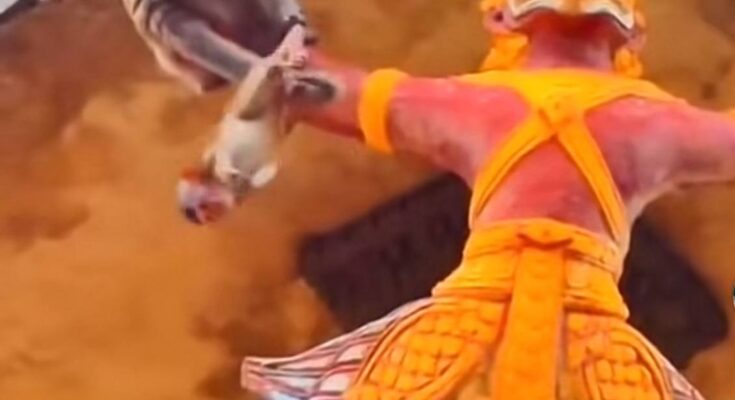In a deeply saddening incident, a baby monkey housed at a wildlife sanctuary passed away unexpectedly after suffering a sudden heart attack — a rare occurrence in such young primates.
The incident took place earlier this week at the Green Valley Primate Rescue Center, where the baby monkey — a three-month-old rhesus macaque named Kavi — had been under close observation since birth. According to caretakers, Kavi had shown no prior signs of illness and had been active, eating well, and engaging playfully with other infant monkeys in the troop just hours before his death.
An Unexpected Medical Emergency
Dr. Asha Menon, a veterinary cardiologist who examined Kavi post-mortem, confirmed that the cause of death was acute cardiac arrest brought on by a congenital heart defect.
“This kind of heart failure in infant monkeys is extremely rare. Kavi had a malformation of the left ventricle, which likely went undetected because he showed no clear symptoms,” said Dr. Menon.
The heart attack, she explained, may have been triggered by a sudden spike in activity or even mild stress, which his underdeveloped heart couldn’t handle.
Emotional Impact on Caretakers and Troop
Kavi had become a favorite among sanctuary staff and visiting biologists due to his curious nature and affectionate demeanor. His death has left the sanctuary’s caretakers heartbroken.
“We’re devastated,” said Maya Rao, one of the primary caregivers. “He was full of life and love. It’s hard to believe something like this can happen so suddenly.”
Interestingly, primates are known to display grief behaviors similar to humans. Staff observed that Kavi’s mother, who had been extremely attached to him, appeared visibly distressed after his passing, often searching for him and refusing food for several hours.
Raising Awareness About Primate Health
While heart conditions in non-human primates are not widely documented, this incident is prompting experts to re-evaluate the screening protocols used for newborn primates in captivity.
“We typically focus on respiratory infections and nutritional deficiencies in young monkeys,” said Dr. Menon. “This tragedy highlights the need to expand our diagnostic tools to include cardiac monitoring, especially in the early stages of development.”
The sanctuary is now planning to collaborate with wildlife veterinary research institutions to conduct a study on congenital heart issues in monkeys, aiming to develop early detection methods that could save future lives.
A Life Remembered
Though Kavi’s life was short, his story may contribute to a broader understanding of primate health and the silent conditions that can claim lives without warning. His caretakers plan to plant a tree in the sanctuary in his memory — a symbol of the joy he brought and the lessons learned from his untimely passing.
Conclusion
Kavi’s sudden death is a reminder that life, even in its most innocent and playful form, is fragile. His story sheds light on the importance of medical awareness in wildlife care and the emotional depth of the animal world. In mourning this little soul, the sanctuary also commits to greater vigilance — ensuring that others like Kavi get a fighting chance.



